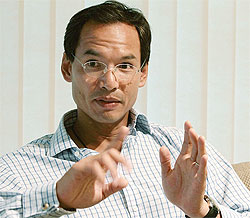AFTER LOSING the court battle to avoid paying huge compensation for the “lesson learned” from the controversial Klong Dan wastewater treatment plant project, the authorities need to find a more efficient asset-tracing mechanism to ensure corrupt officials pay out in the long run, according to the National Anti-Corruption Commission.
Professor Sirilaksana Khoman, chairwoman of the committee for the prevention of economic sector corruption at the NACC, said the country should employ an asset-tracking system to ensure that those who were convicted for corruption would pay the “damages”.
The law could be amended or the government could use FraudNet, a network of 67 lawyers in 60 countries, to track the money trail, she told a seminar on “Klong Dan project, who’s right or wrong to pay for compensation?” at the National Institute of Development Administration on Friday.
Using such mechanisms would make it easier for Thailand to file charges against these officials because it could track the corrupt money.
The Klong Dan project involved corruption at many levels, she said.
Some officials from the company that sold the land to the Pollution Control Department (PCD) were the same persons who sat in the NVPSKG joint venture, the company that the PCD hired for the plant’s construction.
The Bt23-billion construction cost was well over budget, as the real construction cost could be only Bt4 billion, the NACC found.
The construction was not so complicated for the PCD to hire a private firm to run the project. The PCD could actually have proceeded with it, she added.
Sirirat Vasuwat, the NACC’s representative from the research industry, said the Extradition Act needed to be amended, because the law made it hard to bring some of the culprits who fled abroad back to pay compensation.
“Being under this law means the country where the culprits stay must agree with Thailand to have them returned for the charge.
“If they don’t, we can’t do anything else and we will also lose the compensation,” she said.
Medhi Krongkaew, a former NACC member, said that at the time, a representative from the Asian Development Bank (ADB), the lender for the project, also colluded with governmental officials to move the plant site from the Chao Phraya River to Tambon Klong Dan in Samut Prakan, which was not an appropriate area.
After some high-ranking corrupt officials arranged the urgent proposal to move the construction site, the ADB representative endorsed it “overnight” without careful review.
“The project was moved to this site even though the feasibility study carried out by the ADB stated that Tambon Klong Dan was not a suitable location for the construction,” he said.
“This is ridiculous,” he said.
However, Methi, who is also a lecturer at the School of Development Economics of the National Institute of Development Administration, said that to avert corruption in future mega-projects, the government needs to set up a “central monitoring organisation”.
This should include a joint committee from various industries, governmental bodies, civil societies and technical specialists, to arrange decision-making before the project takes off.
The role of this organisation would be to review the feasibility study to determine if the project could be implemented in reality, as well as to check if there would be other people who would receive a hidden benefit from the project.
Last month, the Klong Dan case made the headlines after the PCD entered negotiations to pay compensation to NVPSKG, the six-firm consortium that won the Supreme Administrative Court battle over more than Bt9 billion in compensation over the now-cancelled, graft-plagued project.
The scandal began in 1997 when PCD hired NVPSKG Joint Venture to design and build the Klong Dan wastewater facility worth Bt23 billion.
It was also brought to the attention of the National Counter-Corruption Commission, the predecessor of the NACC since 1999, as several government officials and politicians, including former deputy interior minister Vatana Asavahame, were found guilty of corruption related to the Klong Dan project.
Source: http://www.nationmultimedia.com/national/Corrupt-officials-must-be-made-to-pay-compensation-30249406.html

